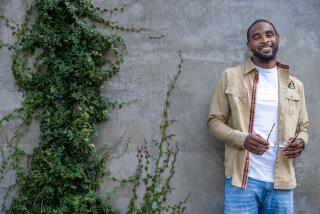Sasway Still Committed to Struggle : Calls His Draft-Resisting Sentence ‘a Badge of Honor’
- Share via
Comparing his felony conviction to a badge of honor, draft resister Benjamin Sasway returned to San Diego on Thursday to talk about his six months in jail and his plans now that he is free.
“It’s good to be back,” Sasway told reporters gathered in his attorney’s downtown office. “It was worth it. I did what I had to do. I feel good about it.”
The 24-year-old former Vista resident was paroled last Friday from the federal prison camp at Lompoc, where he had served less than five months. Combined with 40 days he spent in jail after his August, 1982, conviction, Sasway was given credit for serving six months of his 30-month federal sentence.
Sasway was the first American since the Vietnam War to be indicted for failing to register for the draft.
Sasway was seated in front of a banner from one of the many rallies held in his behalf, that said, “You Can Jail the Resister But not the Resistance.”
He spoke quickly, flitting from topic to topic in an uncharacteristic show of nervousness he attributed to the “culture shock” of getting out of prison. Punctuating his serious tone with a string of one-liners, Sasway seemed content with his freedom and with the philosophy that led to his incarceration.
“I don’t consider getting out of jail and having my legal case over as being the final stage,” he said. “I have decided to commit my life to a struggle for peace.”
Sasway said he hoped to return to school soon at Humboldt State University, where he will work toward a degree in either political science or philosophy. He plans to be the keynote speaker at an Old Town rally Oct. 5, but he said he will continue his habit of not encouraging others to resist draft registration.
“I’m not about to tell somebody to commit five years of their life to fighting a cause that feels hopeless every day,” he said. “They’ve got to weigh it all for themselves.”
Sasway said he still does not intend to register with the Selective Service, and neither he nor his attorney would predict what consequences continued resistance might bring. An assistant U.S. attorney who helped prosecute Sasway in 1982 said the law is not clear on whether a second charge could now be brought against him.
“I certainly don’t feel bad about being a felon,” Sasway said, adding that he would go to prison again rather than register for the draft. “I think it’s sort of a badge of honor. I’m proud of my felony conviction for doing what I had to do.”
Asked if he believed having served a prison term gives him more credibility as an anti-war activist, Sasway parried, “I don’t know. What do you think?”
When someone wondered if Sasway wasn’t out of sync with a perceived mood of renewed conservatism in the country, he replied: “My timing’s always off. I’ve never been quite right on, but I’ve never been far enough off that it’s hurt me.”
Then, saying he differed with President Reagan’s assertion that conservatism was the wave of the future, Sasway quipped: “It’s not the first time I’ve disagreed with the President.”
In prison, Sasway said, “I did a whole lot of nothing.”
“I had three jobs in a little less than five months,” he said. “I had a hard time holding down a job while I was there, which is just about like I am on the street.”
Sasway said he spent “a lot of time reading.”
“I tried to write. I worked on my punctuation, spelling and some of the character flaws that I have.”
Fellow prisoners, mostly there for minor drug offenses, called Sasway “The Dodger” for a few weeks but expressed only fleeting interest in his cause. “I don’t blame them,” he said.
The experience did not change him much, if at all, Sasway insisted.
“I don’t think I’m all that vastly different,” he said. “I haven’t surprised anybody so far. They just shrug their shoulders and say, ‘Oh, God, it’s the same old Ben.’ ”
But Sasway said the prison term gave him time to contemplate his stand and to refine it.
“When I first started (resisting), I refused to call myself a pacifist, but the more I’ve thought about it, I’ve become more committed to nonviolence,” he said.
More to Read
Sign up for Essential California
The most important California stories and recommendations in your inbox every morning.
You may occasionally receive promotional content from the Los Angeles Times.













